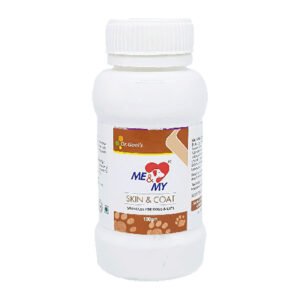The Urinary Dilemma – FAQ Guide On Cystitis: Symptoms, Diagnosis And Homeopathic Treatment

Does your pet show symptoms of painful urination, frequent urination, straining to urinate, excessive thirst, and /or occasional blood in the urine? There is a chance that your pet might have cystitis or urinary tract infection, or both together. Yes, there are certain other conditions as well in which these symptoms may occur, although majorly these symptoms are related to Cystitis and concurrent Urinary Tract Infection. Read more about the cause, symptoms, clinical signs, diagnosis, and differential diagnosis along with treatment and management of Cystitis and UTI in our blog below –
WHAT IS CYSTITIS?
A UTI happens when bacteria enter the urethra and Bladder and begin to multiply and cause localized infection leading to inflammation of the tissues.

WHAT CAUSES CYSTITIS?
2. Stones in the ureter.
3. Bladder Tumours.
2. Hyperadrenocorticism
3. Kidney diseases such as Chronic kidney disease,
4. Diabetes mellitus
This is termed hematuria, and often, you would notice blood in the urine. This is an alarming situation, and one must contact/visit a veterinarian immediately.
Also, it is to be noted that blood in urine can be due to stones in the Bladder or urethra, which on contact with the surface of tissue causes sloughing of tissue and bleeding, which mixes with urine hence hematuria.
Also, tumors or polyps inside the Bladder can cause this condition.
Poisoning (rodent poison) or Kidney Disease too can cause blood in urine or hematuria.
Again, we should rule out any trauma caused externally (vehicle accidents, etc.) which may have damaged your pet’s internal organs.
Yes, this is also a possibility wherein your pet (who may have voided urine before) may show signs of squatting again and again and trying to urinate while excessively straining to pass urine.
Apart from UTI, It is important to rule out other causes such as –
HOW TO DIAGNOSE?
1. Blood Test
A routine blood test – CBC (Complete Blood Count Test) along with LFT (Liver Function Test) and KFT (Kidney Function Test) is carried out to rule out other systemic causes as well as to keep an eye on kidney parameters (such as BUN- blood urea nitrogen, Creatinine, etc) to verify if whether these symptoms are due to Chronic Kidney Disease or Acute Kidney Injury.
2. Radiography (X-Ray)
To check for stones in the Bladder or urinary tract, an x-ray is an excellent option as your Vet can easily and quickly locate and rule out or rule in Stones.
3. USG (Ultra Sonography)
In USG, Bladder wall thickening, changes in Bladder, tumors, growth, etc. can be verified.
In a bladder infection, there is occasionally sloughing off of the bladder wall with thickening of the internal walls.
These can be checked by USG procedure.
4. Urine Analysis.
A urinalysis consists of tests to detect abnormalities in the urine.
Urine culture helps your Vet to find out which and what kind of bacteria are causing this issue and subsequently helps them to make the appropriate Antibiotic choice.
TREATMENT AND MANAGEMENT OF CYSTITIS AND UTIs
Treatment is generally cause-based depending on whether your pet has Bacterial Cystitis or infection due to some other concurrent infection occurring in the body. Usually, in Diabetes, there is UTI, and the treatment involves the management of Diabetes itself, and then the UTI resolves itself. Let’s focus primarily on the treatment protocol for Cystitis and bacterial UTI.
1.NSAIDs or Anti-inflammatory Drugs.
Your Vet may suggest anti-inflammatory drugs such as NSAID or Steroidal Anti-inflammatory drugs such as meloxicam to alleviate the pain and give temporary relief to your pet.
2. Antibiotics
With an appropriate diagnosis and figuring out the bacteria which is causing the inflammatory condition, antibiotics are then chosen based on the bacteria type.
3. Fluid Therapy
If your pet is anorectic (not eating), fluid therapy is offered to ensure that your pet is well hydrated and is getting prompt treatment for the same along with medicines such as Vitamin B complex, etc.

4. Homeopathic Treatment of Cystitis in Dogs & Cats
Our product CYSTIGO for pets is the best remedy in treating symptoms of pain (dysuria), frequent(Polyuria), straining(stranguria), urination, excessive thirst(polydipsia), and blood in the urine(haematuria). It is also very effective in cases of renal calculi and urinary tract infections in pets. Homeopathic remedies work on the principle of “similia similibuscuranter,” which means “like cures like,” so is our CYSTIGO. Hence, such formulations that cause symptoms like a diseased animal in a healthy one are used to prepare this wonder drug formula to be able to treat urinary tract infections for varied reasons
Dosage: 20 drops 3 times a day or as directed by the doctor
Along with conventional therapy, Homeopathic Veterinary Medicine Cystigo for Pets is an excellent cure for Cystitis and UTIs in pets.
Cystitis and Urinary Tract Infections are extremely important medical conditions, and prompt treatment must be given as any negligence may cause major backfires such as Chronic Kidney Disease or systemic infection. On the brighter side, these conditions are easy to diagnose, and with prompt treatment, uneventful recovery is possible. However, as vigilant pet parents, it’s up to you to be prompt, aware, and quick in noticing your pet’s change in behavior and noticing the symptoms.
Taking your pet to your Vet at the earliest results in quick diagnosis, quicker treatment protocol, and quickest recovery.
 Australian Shepherd
Australian Shepherd Beagle
Beagle Belgium Shepherd
Belgium Shepherd Bernese Mountain Dog
Bernese Mountain Dog Border Collie
Border Collie Boxer
Boxer Bulldog
Bulldog Cavalier King Charles Spaniel
Cavalier King Charles Spaniel Chihuahua
Chihuahua Cocker Spaniel
Cocker Spaniel Dachshund
Dachshund Doberman Pinscher
Doberman Pinscher Dogo Argentino
Dogo Argentino French Bulldog
French Bulldog German Shepherd
German Shepherd Golden Retriever
Golden Retriever Great Dane
Great Dane Himalayan Shepherd
Himalayan Shepherd Indie Dogs
Indie Dogs Labrador Retriever
Labrador Retriever Pakistani Bully
Pakistani Bully Pembroke Welsh Corgi
Pembroke Welsh Corgi Pitbull
Pitbull Pomeranian
Pomeranian Poodle
Poodle Pug
Pug Rottweiler
Rottweiler Shih Tzu
Shih Tzu Siberian Husky
Siberian Husky Yorkshire Terrier
Yorkshire Terrier Abyssinian
Abyssinian American Bobtail
American Bobtail American Shorthair
American Shorthair Balinese Cat
Balinese Cat Bengal Cat
Bengal Cat Birman
Birman Bombay Cat
Bombay Cat British Longhair
British Longhair British Shorthair
British Shorthair Burmese Cat
Burmese Cat Devon Rex
Devon Rex Exotic Shorthair
Exotic Shorthair Himalayan Cat
Himalayan Cat Maine Coon
Maine Coon Oriental Shorthair
Oriental Shorthair Persian Cats
Persian Cats Ragdoll
Ragdoll Scottish Fold
Scottish Fold Siamese Cat
Siamese Cat Siberian Cat
Siberian Cat Sphynx Cat
Sphynx Cat














































